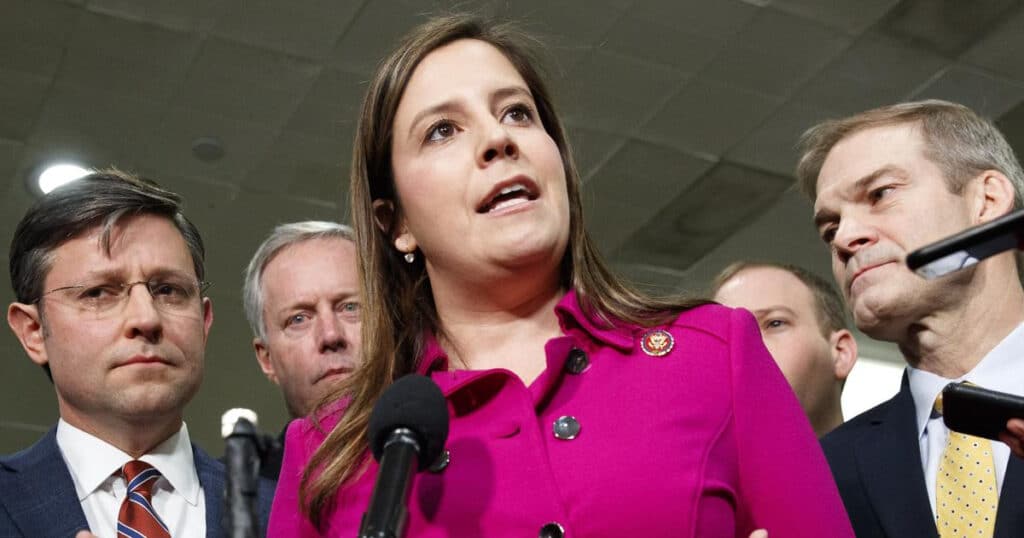
The House GOP Effort to Defund – Not Police, but Wokeness
Through executive orders and budget requests, the Biden administration has sought to embed “diversity, equity, and inclusion” principles across the entirety of the federal government – and in turn to touch the lives of every American. Now members of the Republican House majority, who see this whole-of-government effort as a woke assault on America and its core values, are working to combat it using the power of the purse.
In a series of letters to House appropriations leaders, Rep. Jim Banks and like-minded colleagues have identified and called for the defunding of all “‘woke’ programs and initiatives that are rooted in discrimination and promote far-left ideology in the federal government” in 2024 spending bills.
The letters, obtained exclusively by RealClearInvestigations, are a product of Banks’ Anti-Woke Caucus, a 26-member group of House Republicans launched by the former chair of the Republican Study Committee earlier this year, and notably counting among its members Rep. Elise Stefanik, chair of the House Republican Conference, members of the House Freedom Caucus, and others.
Banks and caucus members delivered the letters to the chairmen and ranking members of each of the 12 House Appropriations Committee subcommittees in late March following the release of President Biden’s $6.8 trillion 2024 budget request.
Each letter flags examples of “woke” offices or policies to which Congress allocated funding in relevant 2023 spending bills, and the associated dollars, and calls for those “and all programs that discriminate based on race, gender, and sexual orientation or seek to disparage our nation’s core ideals and history [to] be decreased to $0” in the 2024 versions of the bills.
A narrow reading of the line items characterized as woke in the letters – which represent only a partial accounting of such programs and initiatives – shows that such programs totaled over $900 million in 2023.
Some of the 2023 programs the Republican members seek to zero out in 2024 include:
- The Commerce, Justice, Science, and Related Agencies Appropriations Act’s more than $200 million in spending on programs aimed at increasing race-based hiring and recruitment in STEM.
- The State, Foreign Operations, and Related Programs Appropriations Act’s $200 million for the Gender Equity and Equality Action Fund.
- The Interior, Environment, and Related Agencies Appropriations Act’s $108 million for “environmental justice” activities.
The $900 million outlay excludes broader items highlighted in the letters, like the $3.5 billion earmarked for energy efficiency and renewable energy in the 2023 Energy and Water Development, and Related Agencies Appropriations Act. Given that the letters represent only a partial accounting of such programs, the vagueness of budget language, and the discretion with which federal agencies can act, tax dollars advancing such efforts may well substantially dwarf these figures.
The letters also target language in the 2023 versions of:
- The Commerce, Justice, Science, and Related Agencies Appropriations Act, claiming that “white supremacists and violent anti-government domestic extremists” are “infiltrating security and law-enforcement agencies.”
- The Department of Homeland Security Appropriations Act, directing Immigrations and Customs Enforcement to detain transgender illegal aliens at facilities only with staff who have received “LGBTI Sensitivity and Awareness Training,” and medical personnel with experience delivering hormone therapies.
- The Energy and Water Development, and Related Agencies Appropriations Act, requesting that the Department of Energy consider social equity and environmental and energy justice in state and community energy programs.
“We believe that the House Republican majority has a responsibility to use its spending powers to ensure that we do not contribute further funding to anti-American and divisive initiatives,” the signatories to each letter wrote.
Tough Odds
They face tough odds given Democratic control of the Presidency and Senate and the persistence of budgetary gridlock in Congress. Though the House has primary power under the Constitution to tax and spend, only three times in the last 47 years has Congress completed a budget in advance of the subsequent fiscal year, which begins October 1 — often relying instead on continuing resolutions that temporarily fund the government at existing levels. This year spending disagreements extend to negotiations to avert a U.S. debt default by relaxing the limit on federal borrowing, a ceiling some expect the government to reach this summer; in those talks, the Biden administration has refused to contemplate any cuts at all.
Should Congress pass and President Biden ultimately compromise on a budget that does not wholly comport with his progressive priorities, his administration could be expected to circumvent the anti-woke constraints. In a recent precedent, President Trump declared a national emergency to justify redirecting funding to build a southern border wall that Congress had not so allocated. The courts ultimately blessed that effort. But in his first day in office, President Biden froze it.
When asked about chances of GOP success in the present effort, Rep. Banks told RCI that:
This needs to be the Republican majority that says enough is enough. Speaker Pelosi famously said “show me your budget and I’ll tell you your values.” This appropriations cycle, Republicans need to show that we value liberty, patriotism and legal equality and that we reject dividing Americans based on race, anti-Americanism, radical gender ideology and climate hysteria.
Even if the defunding effort fails, the Banks-led coalition may see a political benefit to pursuing it: pushing Democrats in the 2024 election cycle to stake out positions on more deeply ideological – and presumably less broadly popular – programs.
RCI asked ranking Democrats on several of the appropriations subcommittees for comment on the Banks letters, and had not received any responses at the time of publication.
The House Anti-Woke Caucus members’ budget requests represent its most extensive legislative effort to date.
In March, the caucus reportedly held its inaugural dinner and endorsed its first piece of legislation, the Fairness, Anti-Discrimination and Individual Rights (FAIR) Act. Sponsored by Anti-Woke Caucus member Tom Tiffany, a Republican from Wisconsin, the bill would bar any federal agency, contractor, state, or private entity that receives federal funding from discriminating against or granting preferential treatment on the basis of race, color, or national origin.
Banks announced he would be establishing the Anti-Woke Caucus in January, pledging to “fight institutionalized wokeness” – an announcement that came just days before he would declare his candidacy for an open U.S. Senate seat in Indiana in 2024.
In an interview for RealClearPolitics in February, the Indiana congressman indicated that the caucus had three missions – the first two to which the appropriations subcommittee letters seem to aim: To “Identify Wokeism, defund it and uproot it, and then hold those accountable for it.”
Banks added that wokeism is “a cancer that’s going to eat our country inside out and kill us if we don’t do something about it.”
This article was originally published by RealClearInvestigations and made available via RealClearWire.



